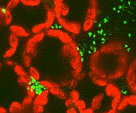Plant Pathology, Department of

Department of Plant Pathology: Faculty Publications
Document Type
Article
Date of this Version
January 2001
Abstract
• Plant symbiotic fungi are generally thought to express a single lifestyle that might increase (mutualism), decrease (parasitism), or have no influence (commensalism) on host fitness. However, data are presented here demonstrating that plant pathogenic Colletotrichum species are able to asymptomatically colonize plants and express nonpathogenic lifestyles.
• Experiments were conducted in growth chambers and plant colonization was assessed by emergence of fungi from surface sterilized plant tissues. Expression of symbiotic lifestyles was assessed by monitoring the ability of fungi to confer disease resistance, drought tolerance and growth enhancement.
• Several pathogenic Colletotrichum species expressed either mutualistic or commensal lifestyles in plants not known to be hosts. Mutualists conferred disease resistance, drought tolerance, and/or growth enhancement to host plants. Lifestyle-altered mutants expressing nonpathogenic lifestyles had greater host ranges than the parental wildtype isolate. Successive colonization studies indicated that the ability of a symbiont to colonize a plant was dependent on previous colonization events and the lifestyles expressed by the initial colonizing fungus.
• The results indicate that the outcome of symbiosis is controlled by the plant’s physiology.


Comments
Published in New Phytologist (2001) 151 : 705–716.